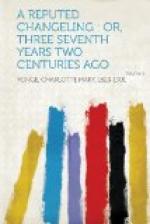He was evidently anxious for silence, and Anne said no more. Hans presently brought from some unknown quarter, a little stout pony bridled and saddled; of course not with a side saddle, but cloaks were arranged so as to make a fairly comfortable seat for Anne, and Peregrine led the animal on the ascent to St. Catherine’s Down. It was light enough to dispense with the lanterns, and as they mounted higher the glorious sight of daybreak over the sea showed itself— almost due east, the sharp points of the Needles showing up in a flood of pale golden light above and below, with gulls flashing white as they floated into sunlight, all seeming to Anne’s thankful heart to be a new radiance of joy and hope after the dark roaring terrors of the Chine.
As they came out into the open freedom of the down, with crisp silvery grass under their feet, the breadth of sea on one side, before them fertile fields and hills, and farther away, dimly seen in gray mist, the familiar Portsdown outlines, not a sound to be heard but the exulting ecstasies of larks, far, far above in the depths of blue, Peregrine dared to speak above his breath, with a question whether Anne were at ease in her extemporary side saddle, producing at the same time a slice of bread and meat, and a flask of wine.
“Oh, how kind! What care you take of me!” she said. “But where are we going?”
“Wherever you command,” he said. “I had thought of Carisbrooke. Cutts is there, and it would be the speediest way.”
“Would it not be the most dangerous for you?”
“I care very little for my life after this.”
“Oh no, no, you must not say so. After what you are doing for me you will be able to make it better than ever it has been. This is what I thought. If you would bring me in some place whence I could reach Sir Edmund Nutley’s house at Parkhurst, his servants would help me to do the rest, even if he be not there himself. I would never betray you! You know I would not! And you would have full time to get away to your place in Normandy with your friends.”
“You care?” asked he.
“Of course I do!” exclaimed she. “Do I not feel grateful to you, and like and honour you better than ever I could have thought?”
“You do?” in a strange choked tone.
“Of course I do. You are doing a noble, thankworthy thing. It is not only that I thank you for his sake, but it is a grand and beautiful deed in itself; and if my dear mother know, she is blessing you for it.”
“I shall remember those words,” he said, “if—” and he passed his hand over his eyes. “See here,” he presently said; “I have written out a confession of my identity, and explanation that it was I who drew first on Archfield. It is enough to save him, and in case my handwriting has altered, as I think it has, and there should be further doubt, I shall be found at Pilpignon, if I get away. You had better




